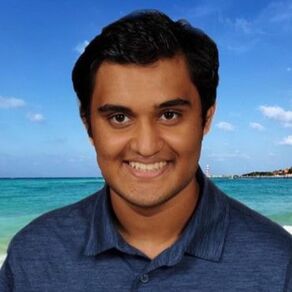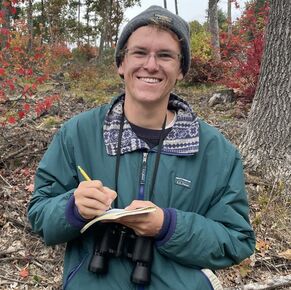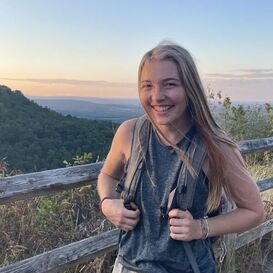|
Sawyer Balint graduated from Brown University with an Sc.B. in Environmental Science and recently finished a two-year appointment at the U.S. Environmental Protection Agency as an Oak Ridge Institute for Science and Education fellow, where he investigated the biogeochemical responses of estuaries to climate change and managed nitrogen reductions. Funded by the NSF Graduate Research Fellowship Program, Sawyer is working to measure benthic gas fluxes through the development of an in-situ underwater mass spectrometer. If you can’t find him in the lab, he's probably sailing in the North Atlantic with his family.

Lena Champlin is a first-year postdoctoral fellow, funded by the BU Society of Fellows program. She received her doctorate at the Academy of Natural Sciences of Drexel University in Philadelphia, where her dissertation examined estuarine water quality including eutrophication over decadal to millennial scales using biogeochemical proxies in sediment cores and historical shells. During her postdoc, her interdisciplinary research will investigate spatial and temporal patterns of C sequestration in salt marshes and apply her love of using art in science communication about urban marshes.

Sophia Glastein is in her fourth year studying marine science and chemistry at BU. Visiting Cape Cod every summer, Sophia has always had an interest in the coastal ecosystems of New England. In the Fulweiler Lab, she hopes to learn more about how to track nutrient cycling in marine systems and organisms and is currently focusing on that of oysters! Sophia hopes to connect the general public to the coastal ecosystems they impact through outreach efforts in her future career. In addition to being a student, Sophia is also a dancer and enjoys cooking and baking.

Ilana Jacobs is a 4th year undergraduate at Boston University pursuing her B.A. In Marine Science. She grew up in Denver Colorado, and spent her summers in Woods Hole, MA. Most recently worked on developing genetic tools to study an anoxic ciliate and the function of the Mitochondrial Related Organelle with Dr. Virginia Edgcomb and Dr. Colleen Cavanaugh at WHOI/Harvard. Ilana is most interested in studying the impacts of microbial communities on biogeochemical cycles in the deep sea. Outside of the lab, Ilana loves scuba diving, skiing, and backpacking!
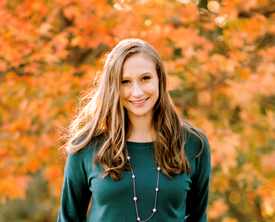
Carolyn Hagy is a fourth year undergraduate student at Boston University studying Human Physiology in the Sargent College of Health and Rehabilitation Sciences. She grew up in Pensacola, FL in a family of marine scientists, which fostered her passion for protecting the oceans and other aquatic ecosystems. Because she is concentrating on pre-medical sciences in college, she has a particular interest in environmental justice and the impact of environmental issues on healthcare. Outside of the lab, she is a member of the Boston University Synchronized skating team and teaches swim lessons at the BU swim school.
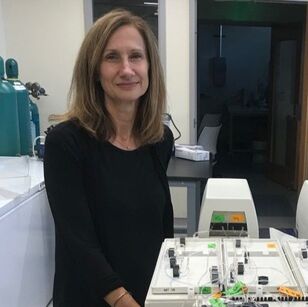
Melissa Ederington Hagy received a B.S. in Biology from the University of Arkansas at Little Rock and a M.S. in Marine Science from the University of Maryland College Park. Her graduate research at the Chesapeake Biological Laboratory focused on the transfer of biomarkers in a marine food web. Upon graduation, she worked at the Virginia Institute of Marine Science where she was involved in research using biomarkers as indicators of organic matter in the Sacramento-San Joaquin River Delta. Most recently she was a research associate at the University of West Florida where she participated in projects measuring polycyclic aromatic hydrocarbons related to the Deepwater Horizon oil spill in the Gulf of Mexico. Melissa has extensive experience with a variety of analytical instruments such as Nutrient AutoAnalyzer, GC, GC/MS, and HPLC.
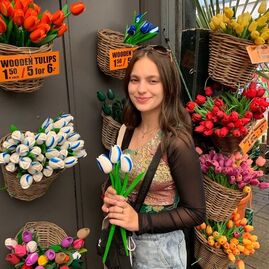
Isabela Roy is a junior studying marine science. While I did not live on the coast growing up, I live in a small town in northwest Connecticut, I have always had an interest in the ocean and I hope to study coral reefs and phytoplankton in the future. Outside of classes I am involved in several clubs such as UWise (women in stem) as well as the Marine Science Association.
|
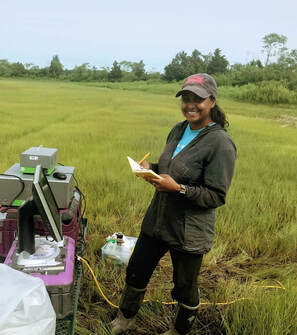
Nia Bartolucci graduated magna cum laude from Mount Holyoke College in 2017 with a BA in Environmental Studies and a concentration in ecosystem science. She is interested in studying how climate change and other anthropogenic impacts are affecting the biogeochemistry and ecosystem function of coastal wetlands. Funded by NOAA Margaret A. Davidson Fellowship and Clare Booth Luce Scholarship, Nia is currently studying how we can make coastal wetlands more resilient to rising sea levels in New England. Specifically, her dissertation research investigates how the salt marsh resiliency strategy thin layer placement of sediment (TLP) impacts salt marsh biogeochemistry.
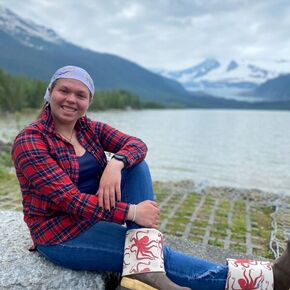
Meredith Fritsch is a senior pursuing a degree in marine science at Boston University. She grew up on the waters of Southeast Alaska, fascinated by local marine ecosystems and determined to dedicate her life to the study of the ocean. Her interests include biological oceanography, climate change, anthropogenic impacts on the ocean, and marine conservation. Outside of the lab, Meredith can be found researching sharks and whales, reading, skating with the Boston University Synchronized Skating Team, or enjoying the outdoors.

Alex Geisser received her B.S in Marine Science with a minor in Environmental Science from the University of New England in 2020. She is interested in exploring the role of macroalgae in coastal biogeochemical cycling, carbon sequestration, and how it may be affected by climate change. Funded by RI Sea Grant and NBEP, Alex is currently studying the potential for macroalgae to act as a reservoir for pathogenic vibrio bacteria in the context of oyster aquaculture.

Lydia Jefferson (they/them) graduated with honors from the University of Missouri-Columbia with a BS in Environmental Sciences-Water in 2022. Prior to their graduate studies, they focused on land use's impacts on respiration rates in urban streams. Wanting to immediately continue their education, they came to Boston University to pursue their research interests in the intersectionality between urban and coastal water quality with environmental injustice. Their dissertation research will focus on the impact combined sewer overflow events and microplastics have on water quality in the Greater Boston area as well as the drinking water supplies of environmental justice communities across Massachusetts. Outside of the lab, you can find Lydia enjoying random events across Boston, spending time with friends and family, or planning their next tattoo!
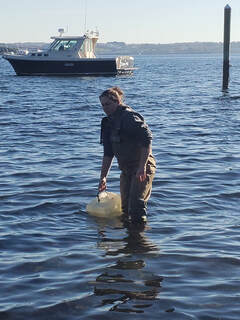
Cat Mahoney graduated from Maine Maritime Academy in 2021 with a B.S. in Oceanography. During her time at MMA, she completed a Research Experience for Undergraduates (REU) at the Bigelow Laboratory for Ocean Sciences, investigating alternative phosphorus sources for open ocean phytoplankton. She was also a recipient of the NOAA Ernest F. Hollings scholarship and was a data analytics intern for the NOAA Pacific Marine Environmental Laboratory, researching methane sources in Puget Sound. In the fall of 2023, Cat will be transitioning her role within the lab from technician to student to pursue her PhD. Cat is interested in the nitrogen cycle, from nitrogen fixation to DON. Outside of the lab, you can find her reading sci-fi/fantasy or enjoying a walk along the Charles.
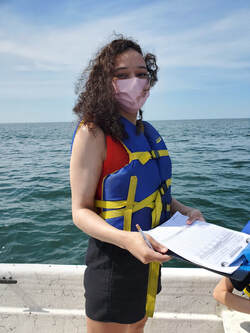
Helena Shenk grew up in Connecticut a stone's throw away from Mystic Seaport (two hours away but close enough) with three siblings and two cats. Although she has been considering paleontology or archeology, she ultimately set her sights on marine biology. She recently moved to Massachusetts with her family and is now a rising junior majoring in Marine Science. She is also a recipient of the NOAA Ernest F. Hollings scholarship.
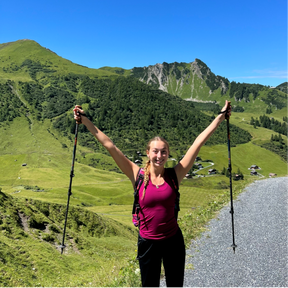
Cora Skaggs is a second year undergraduate student currently pursuing a B.A. in Marine Science and minoring in Spanish. She has lived in Kansas City, MO her whole life, and is excited to live on the Coast, to be able explore the impacts of human activity on marine ecosystems.
. |
